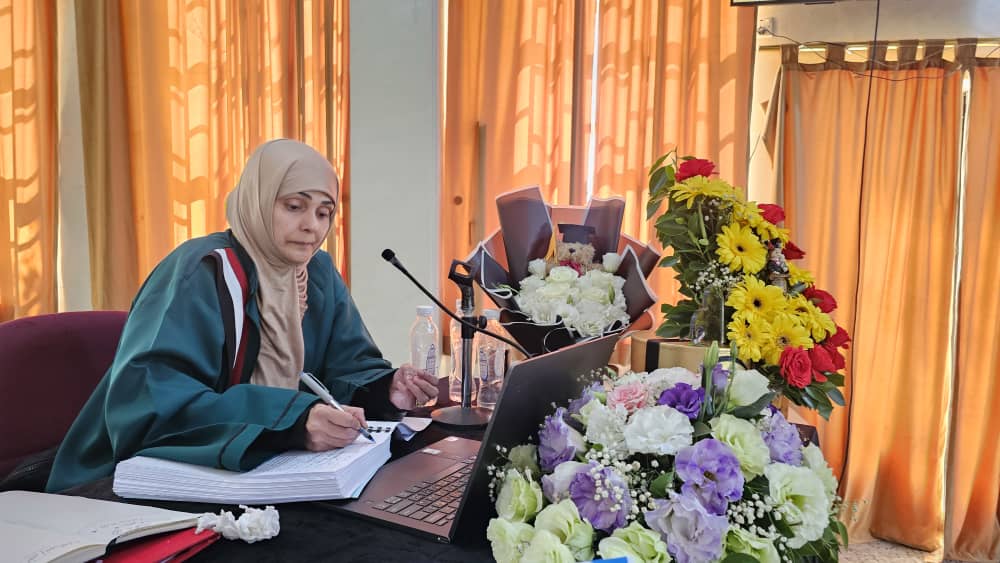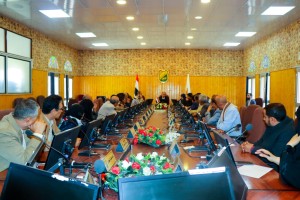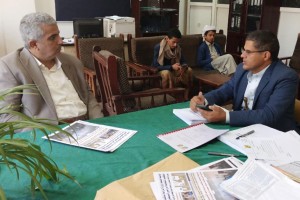Defense of the Doctoral Dissertation by Researcher Rana Hashem Mahmood Mohmed
- Categories Letters and Promotions - Graduate Studies, news, Regulations - Postgraduate Studies
- Date October 28, 2024

On October 26, 2024 (23 Rabi’ al-Thani 1446 AH), Rana Hashem Mahmoud Muhammad successfully defended her doctoral dissertation in the Department of International Development at the Inclusive Development Research Center, University of Sana’a.
The dissertation, titled “STRATEGIES OF MODERN METHODOLOGIES IN PROJECT MANAGEMENT AND THEIR REFLECTION ON SUSTAINABLE DEVELOPMENT IN THE REPUBLIC OF YEMEN TELECOMMUNICATIONS SECTOR” was evaluated by a committee comprising:
- Dr. Abdul Salam Ahmed Al-Dar Al-Hakimi (External Examiner and Chair of the Committee)
- Prof. Dr. Nabeel T. Alsohybe (Supervisor, Chair, and Member)
- Prof. Dr. Qais Ahmed Haza’ Al-Mohamadi* (Internal Examiner and Member)
This study addresses the concept of sustainable project management by analyzing its multiple dimensions. Of these, the strategic dimension emerges as a vital element in the development of strategies that support the achievement of sustainable development goals. Through this dimension, the study seeks to understand how modern methodologies such as Agile, Lean, and Six Sigma can be integrated into sustainable project management strategies, enhancing the ability of organizations to effectively balance economic, environmental, and social objectives.
Using a mixed-methods approach, the research analyzed quantitative data collected through a survey of 150 telecommunications professionals, complemented by qualitative insights from 21 in-depth interviews with project managers and stakeholders of telecommunications sector in Yemen.
The findings Indicate a predominant reliance on traditional methodologies, such as Waterfall, with limited adoption of modern methodologies like Agile, Lean, and Six Sigma. While there is growing familiarity with these modern approaches, the integration of sustainability objectives remains inconsistent. Some projects have adopted energy-efficient practices; however, comprehensive sustainability strategies are lacking. Despite the recognition of sustainability’s importance, practical barriers persist, revealing a partial alignment between project management methodologies and sustainability goals.
Key challenges identified include inadequate training, regulatory obstacles, and insufficient stakeholder support, which significantly impede the effective incorporation of sustainability practices into project management processes. To address these challenges, the study recommends strengthening training programs, improving the integration of sustainability into project management, enhancing stakeholder involvement, adopting global best practices, and improving the documentation of sustainable practices.
The defense was attended by a diverse audience, including academics, researchers, students, and interested parties, along with colleagues and family members of the researcher.
Discover more from Sana'a University
Subscribe to get the latest posts sent to your email.
Previous post
Conclusion of Capacity Building Program for Service Institutions in Water, Roads, and Solid Waste Management Sectors
Next post






